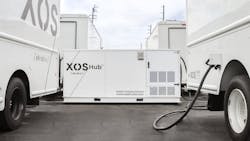Xos Hub gets major upgrades and a purchase order from Xcel Energy
Xos Inc. recently unveiled its next-generation mobile charging unit, the Xos Hub. It is designed to help fleets electrify without installing charging infrastructure. Xcel Energy, a clean energy provider, has signed a purchase order to secure two new Hubs for use at remote worksites.
The new generation of the Xos Hub offers 280kWh of energy capacity and a charging capability of up to 160kW. This is up to four times the charge rate compared to previous iterations. The Xos Hub has four standard CCS1 charge heads and weighs less than 10,000 lb., eliminating the need for a commercial driver's license to transport the device. Furthermore, this version of the Xos Hub has a lower starting price than previous versions.
The Hub can be powered by existing power infrastructure at depots or facilities without needing upgrades. Alternatively, the Hub can also be charged by a CCS1 inlet at a DC fast charging station on-site or in the field. As a result, the Hub can be used for a wide range of applications, including stopgap charging for EV fleets, remote and rescue charging, semi-permanent charging, and backup power during grid outages.
"The Xos Hub is a game changer for fleets looking to electrify," Xos CEO Dakota Semler said. "It's a cost-effective solution that can be deployed quickly and easily. With the lower weight and smaller footprint, it's an even more flexible system for mobile charging."
See also: 30x30: Ford Pro, Xcel Energy detail ambitious fleet electrification plan
Xcel Energy plans to use temporary charging at construction sites where zero-emission vehicles are deployed to help achieve its clean transportation vision. Temporary charging will serve as a remote operating base for electric vehicles, enabling the electrification of worksites.
"By 2050, Xcel Energy is committed to delivering zero-carbon fuel for all vehicles in the states we serve, and a key part of that vision is electrifying our own fleet," said Jeff Savage, Xcel Energy's senior VP, chief audit and financial services officer. "We're excited about our clean transportation future, and the ability to charge our electrified equipment at remote worksites is another step we're pursuing to reduce carbon emissions."
About the Author
FleetOwner Staff
Our Editorial Team
Kevin Jones, Editorial Director, Commercial Vehicle Group
Josh Fisher, Editor-in-Chief
Jade Brasher, Senior Editor
Jeremy Wolfe, Editor
Jenna Hume, Digital Editor
Eric Van Egeren, Art Director
